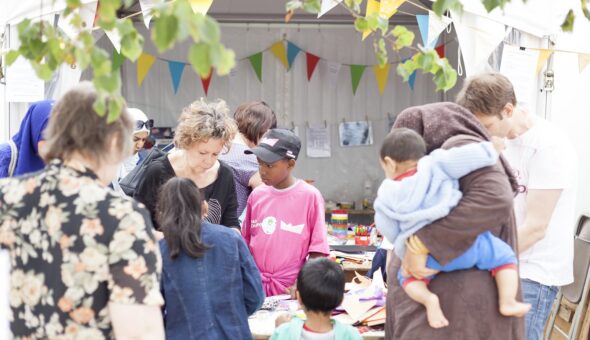A lecture series is a common feature of many UK universities' public-facing programme of events. Typically, these are dominated by the single academic communicating their research to a large audience in a lecture theatre situated deep within the campus. While there’s nothing inherently wrong with this model, we wanted to play around with it and test some ideas when we assumed responsibility for the University of Bath's Minerva Lecture Series. Over the last 18 months, we've created a programme of events in the series that has fostered a dialogue between researcher and audience and acted as a platform for both researchers and the local community. Here’s some of what we’ve learned:
A platform for community organisations
A lecture series is a platform that is usually given to academics. What if you also offered that platform to local communities whilst keeping a focus on research? What would that look like? We tried this out using two main techniques. Firstly, we asked our speakers to invite their research collaborators to chair or participate in their lecture. Secondly, we have used a Minerva lecture to set up conversations between researchers and local community groups who are interested in their research by inviting members of those community groups to introduce or chair the event. For example, our last Minerva lecture, ‘Disease in a Dish: A New Way of Studying Dementia’ was hosted by Stephen Linsey from the Alzheimer’s charity BRACE, who said:
‘I’m not from the University and I have no connections with the University, but it is through Vasanta’s (the speaker) research that I know about her and why it’s my pleasure to introduce her talk’
Having a chair from outside the University changes the power balance of a lecture. Instead of being clearly held by the institution, the Minerva Lecture Series has become a platform for research and all those affected by it. The University hosts the lecture series rather than owning it and gives community groups a platform to share their work alongside research from the University. The chair has the opportunity to share their work through both an introduction at the start of the lecture and being an active part of the Q&A section and responding to questions that are more relevant to their work than the researcher.
Moving the lecture series online has allowed us to invite a greater variety of chairs from organisations across the South West of England and opens up the opportunity to invite guests from around the world with travel barriers removed.
A variety of formats
Another change we made to the Minerva Series was to increase the variety of event formats that make up the programme. The series now consists of panel discussions, film screenings, in-conversations and comedy shows, alongside typical lectures. Having a diverse variety of formats has helped us diversify our audience, our content and the participating speakers and provide a richer experience for repeat audience members.
For example, an ‘in-conversation’ event we held back in June 2020 ‘, Climate change, coronavirus and anxiety’ dedicated more than half the run time to audience questions. While this event attracted a smaller than usual audience, we received more audience questions than we had attendees. The two speakers had enough time to address almost all the questions. In this way, the audience was able to shape the direction and content of the session. A good example of how alternate formats can create a rich two-way interaction between the audience and researchers.
Topics that are relevant to the local community
As lecture series have traditionally been a platform for academics, it’s no surprise that the topics are often driven by what academics are studying and which academics are willing to come forward. There’s nothing wrong with this, and sharing upcoming and breaking research is an important role for the lecture series, but we wanted to go one step beyond and match our research strengths to community interest.
We’re currently in the planning stages for the 2021/22 Minerva Series, and we're testing out how best to align the topics communities are interested in and our research strengths. Our working process involves:
- making a list of topics that reflect our research strengths
- reaching out to key community partners and third sector organisations to ask them and their members/service users what topics they are most interested in
- looking for overlaps between these two areas
This might mean seeking out new speakers if a key area of interest has emerged that we hadn’t anticipated or provide an opportunity for us to link up community organisations with researchers that share an interest as panellists or chairs for a lecture. Most important, it will ensure our lecture series reflects the interests of the local community.
An engaged lecture series
Throughout this work, we’ve learned not to give up on lecture series as an engagement method. With the right modifications and careful thinking, you can foster meaningful two-way engagement through a public lecture. Through this process we have seen audience numbers rise from 20 – 100 attendees in 2018/19 to consistently reaching 100 – 200+ attendees in 2020/21. We’ve also seen the diversity of the audience increase with a higher percentage of younger (34-45) professionals attending. We also have found 30% of the audience attending had no prior link to the University of Bath, suggesting the programme is successfully reaching and sharing research with new audiences.
Recognising the Minerva Series’ value for creating partnerships with and giving a platform to community groups and third sector organisations has helped us reaffirm the value of the Minerva Series when the University of Bath has a renewed focus on our civic and local engagement.
Rob Cooper is Public Engagement Officer at the University of Bath
Respond



